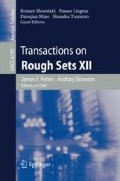Abstract
Many researchers are working on developing fast data mining methods for processing huge data sets efficiently, but some current reduction algorithms based on rough sets still have some disadvantages. In this paper, we indicated their limitations for reduct generation, then a new measure to knowledge was introduced to discuss the roughness of rough sets, and we developed an efficient algorithm for knowledge reduction based on rough sets. So, we modified the mean decision power, and proposed to use the algebraic definition of decision power. To select optimal attribute reduction, the judgment criterion of decision with an inequality was presented and some important conclusions were obtained. A complete algorithm for the attribute reduction was designed. Finally, through analyzing the given example, it is shown that the proposed heuristic information is better and more efficient than the others, and the presented method in the paper reduces time complexity and improves the performance. We report experimental results with several data sets from UCI Machine Learning Repository, and we compare the results with some other methods. The results prove that the proposed method is promising, which enlarges the application areas of rough sets.
Access this chapter
Tax calculation will be finalised at checkout
Purchases are for personal use only
Preview
Unable to display preview. Download preview PDF.
References
Pawlak, Z.: Rough sets. Int. J. of Comp. Inf. Sci. 11, 341–356 (1982)
Xu, J.C., Shen, J.Y., Wang, G.Y.: Rough set theory analysis on decision subdivision. In: Tsumoto, S., Słowiński, R., Komorowski, J., Grzymała-Busse, J.W. (eds.) RSCTC 2004. LNCS (LNAI), vol. 3066, pp. 340–345. Springer, Heidelberg (2004)
Xu, J.C., Shen, J.Y., An, Q.S., Li, N.Q.: Study on decision subdivision based on information granularity and rough sets. Journal of Xi’an Jiaotong University 39(4), 335–338 (2005)
Xu, J.C., Sun, L.: Knowledge reduction and its rough entropy representation of decision tables in rough set. In: Proceedings of the 2007 IEEE International Conference on Granular Computing, Silicon Valley, California, pp. 249–252 (2007)
Pawlak, Z.: Rough set theory and its application to data analysis. Cybernetics and Systems 29, 661–668 (1998)
Polkowski, L., Tsumoto, S., Lin, T.Y. (eds.): Rough Set Methods and Applications. Physica-Verlag, Berlin (2000)
Pawlak, Z.: Rough sets and intelligent data analysis. Inf. Sci. 147, 1–12 (2002)
Bhatt, R.B., Gopal, M.: On fuzzy-rough sets approach to feature selection. Pattern Recognition Letters 26, 965–975 (2005)
Dash, M., Liu, H.: Consistency-based search in feature selection. Artificial Intelligence 151, 155–176 (2003)
Swiniarski, R.W., Skowron, A.: Rough set methods in feature selection and recognition. Pattern Recognition Letters 24, 833–849 (2003)
Guyon, I., Elisseeff, A.: An introduction to variable and feature selection. Journal of Machine Learning Research 3, 1157–1182 (2003)
Wang, G.Y.: Rough reduction in algebra view and information view. International Journal of Intelligent System 18, 679–688 (2003)
Wang, G.Y., Yu, H., Yang, D.C.: Decision table reduction based on conditional information entropy. Journal of Computers 25(7), 759–766 (2002)
Miao, D.Q., Hu, G.R.: A heuristic algorithm for reduction of knowledge. Journal of Computer Research and Development 36(6), 681–684 (1999)
Wang, J., Wang, J.: Reduction algorithms based on discernibility matrix: the ordered attributes method. J. of Comp. Sci. and Tech. 16(6), 489–504 (2001)
Guan, J.W., Bell, D.A., Guan, Z.: Matrix computation for information systems. Information Sciences 131, 129–156 (2001)
Liu, S.H., Sheng, Q.J., Wu, B., et al.: Research on efficient algorithms for rough set methods. Journal of Computers 26(5), 524–529 (2003)
Xu, Z.Y., Liu, Z.P., et al.: A quick attribute reduction algorithm with complexity of Max(O(|C||U|),O(|C| 2|U/C|)). Journal of Computers 29(3), 391–399 (2006)
Hu, Q.H., Zhao, H., et al.: Consistency based attribute reduction. In: Zhou, Z.-H., Li, H., Yang, Q. (eds.) PAKDD 2007. LNCS (LNAI), vol. 4426, pp. 96–107. Springer, Heidelberg (2007)
Mi, J.S., Wu, W.Z., Zhang, W.X.: Approaches to knowledge reductions based on variable precision rough sets model. Information Sciences 159(3-4), 255–272 (2004)
Liang, J.Y., Shi, Z.Z., Li, D.Y.: Applications of inclusion degree in rough set theory. International Journal of Computationsl Cognition 1(2), 67–68 (2003)
Jiang, S.Y., Lu, Y.S.: Two new reduction definitions of decision table. Mini-Micro Systems 27(3), 512–515 (2006)
Guan, J.W., Bell, D.A.: Rough computational methods for information systems. International Journal of Artificial Intelligences 105, 77–103 (1998)
Ślȩzak, D.: Approximate entropy Reducts. Fundamenta Informaticae 53, 365–390 (2002)
Ślȩzak, D., Wróblewski, J.: Order based genetic algorithms for the search of approximate entropy reducts. In: Wang, G.Y., Liu, Q., Yao, Y.Y., Skowron, A. (eds.) Proc. Conference Rough Sets, Fuzzy Sets, Data Mining, and Granular Computing. LNCS (LNAI), vol. 2639, pp. 308–311. Springer, Heidelberg (2003)
Liu, Q.H., Li, F., et al.: An efficient knowledge reduction algorithm based on new conditional information entropy. Control and Decision 20(8), 878–882 (2005)
Wang, G.Y.: Calculation methods for core attributes of decision table. Journal of Computers 26(5), 611–615 (2003)
Jiang, S.Y.: An incremental algorithm for the new reduction model of decision table. Computer Engineering and Applications 28, 21–25 (2005)
Ślȩzak, D.: Various approaches to reasoning with frequency-based decision reducts: A survey. In: Polkowski, L., Lin, T.Y., Tsumoto, S. (eds.) Rough Set Methods and Applications: New Developments in Knowledge Discovery in Information Systems, vol. 56, pp. 235–285. Springer, Heidelberg (2000)
Han, J.C., Hu, X.H., Lin, T.Y.: An efficient algorithm for computing core attributes in database systems. In: Zhong, N., Raś, Z.W., Tsumoto, S., Suzuki, E. (eds.) ISMIS 2003. LNCS (LNAI), vol. 2871, pp. 663–667. Springer, Heidelberg (2003)
Author information
Authors and Affiliations
Editor information
Editors and Affiliations
Rights and permissions
Copyright information
© 2010 Springer-Verlag Berlin Heidelberg
About this chapter
Cite this chapter
Xu, J., Sun, L. (2010). A New Knowledge Reduction Algorithm Based on Decision Power in Rough Set. In: Peters, J.F., Skowron, A., Słowiński, R., Lingras, P., Miao, D., Tsumoto, S. (eds) Transactions on Rough Sets XII. Lecture Notes in Computer Science, vol 6190. Springer, Berlin, Heidelberg. https://doi.org/10.1007/978-3-642-14467-7_4
Download citation
DOI: https://doi.org/10.1007/978-3-642-14467-7_4
Publisher Name: Springer, Berlin, Heidelberg
Print ISBN: 978-3-642-14466-0
Online ISBN: 978-3-642-14467-7
eBook Packages: Computer ScienceComputer Science (R0)

